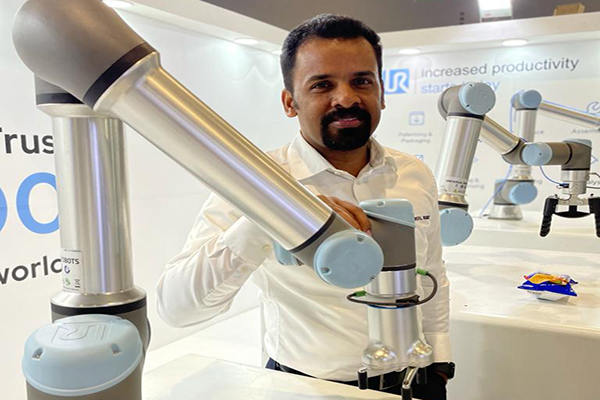The manufacturing industry has evolved considerably over the last few years and the year 2023 marks a significant milestone. It has been a year since the union of intelligence and manufacturing capability has reached previously unheard-of heights, smart manufacturing technology stands tall as the beacon guiding this transformative journey as sectors readjust, adapt, and anticipate a future driven by efficiency and sustainability. Over the years, manufacturing industry has transitioned from machine-based assembly lines to “smart factories,” which increasingly use robotics, the Internet of Things (IoT), data analytics, augmented reality (AR), and other cutting-edge technology.
Leading manufacturers are investing highly to improve in the following three main technology areas, according to Deloitte’s 2023 outlook survey: robotics and automation, to speed manufacturing, reduce costs, and alleviate the labour shortage (cited by 62% of respondents); data analytics, to improve forecasting and spot supply shortages before they affect the manufacturing line (60%); and IoT, to collect and analyze data from sensors on the factory floor and embedded in industrial equipment to improve manufacturing, supply chain tracking, and product maintenance (39%). The lowest-priority technologies cited in the survey were blockchain (4%) and quantum technology (5%).
The use of data as a driving factor behind decision-making is one of the hallmarks of this transition. A plethora of real-time data is generated by interconnected devices and sensors implanted throughout the production ecosystem, providing important insights into all aspects of operations. This data is more than just raw data; it is the fuel that drives predictive maintenance, optimises production schedules, and fine-tunes supply chain operations.
AI, the anchor of this revolution, has transcended its role as a buzzword and emerged as a game-changer. Machine learning algorithms analyse colossal datasets, discern patterns, and refine processes autonomously, enabling machines to learn and adapt in real-time. These AI-driven systems optimize productivity, minimize errors, and pave the way for the era of autonomous manufacturing.
Moreover, the integration of robotics into manufacturing workflows has transcended the realm of mere automation. Collaborative robots, or cobots, work alongside human counterparts, augmenting capabilities and ensuring a harmonious interplay of skill sets. These cobots aren’t just enhancing productivity; they are also elevating workplace safety and fostering a new paradigm of human-robot collaboration.
The concept of smart factory, which is a highly connected and digitally optimised industrial environment, has progressed from a vision to an actual reality. These factories are dynamic, flexible, and adaptive, conducting a symphony of processes that are both efficient and environmentally conscious. With smart manufacturing minimising waste, energy consumption, and environmental effect, sustainability has become an intrinsic aspect of this technological revolution.
However, the journey toward embracing smart manufacturing isn’t devoid of challenges. The amalgamation of complex technologies requires a skilled workforce adept at navigating this digital terrain. Bridging the skills gap and empowering the workforce with the necessary expertise remains a crucial endeavour.
As we stride further into the era of smart manufacturing, collaboration becomes the linchpin for progress. Collaborative efforts between industry stakeholders, technology innovators, policymakers, and academia are imperative to foster an environment conducive to innovation, knowledge exchange, and standardization.
The year 2023 marked a watershed moment in the manufacturing world, when technology advances collided with imaginative plans. It was a year that epitomised the beginning of a new era, one in which intelligence and invention combined to reinvent the very nature of industry. Embracing change and utilising the power of smart manufacturing technology will be the cornerstones of sustained development, resilience, and competitiveness in the global industrial environment as we travel this transformative path.













